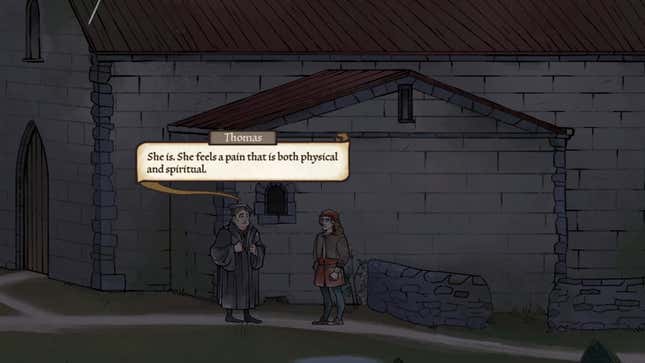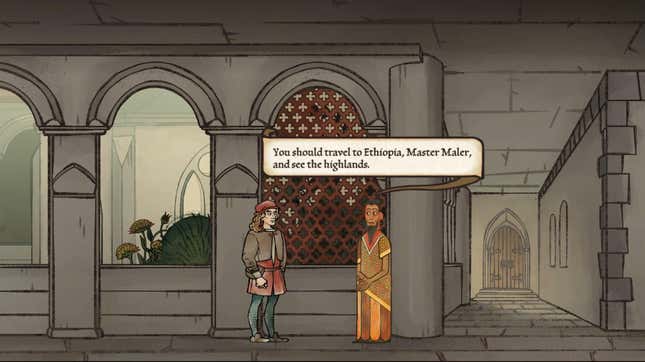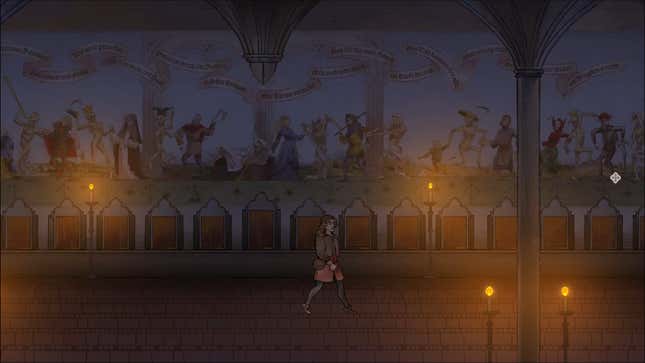Welcome to 16th-century Europe. You are Andreas Maler, an artist living among the people of the fictional town of Tassing, where things are about to change in the wake of a murder. How will they change? That’s what you’ll decide in Pentiment, a narrative adventure game that brings together evocative art, roleplaying elements, and a low barrier to entry thanks to its point-and-clicky gameplay. The individual elements that make up Pentiment all tie together so seamlessly and effortlessly that they combine into a rich tapestry of game design and storytelling. To be sure, there’s more story and reading here than there is anything else, but it’s hard to put this mystery and its engaging cast of characters down.
Developed by Obsidian Entertainment, Pentiment (available on Windows and Xbox, standalone or via GamePass) is a wonderful blend of historical fiction, point-and-click adventure, and roleplaying-esque decisions that have branching narrative consequences. With a 2D art style inspired by medieval manuscripts, you’ll guide Andreas about Tassing as he unravels the details behind a shocking and suspicious murder. Who you talk to, what you do with what you learn, and how you choose to roleplay as Andreas all assemble in unique and unexpected ways. I haven’t yet arrived at the ultimate conclusion of this game, but the characters and story have me so hooked, I’m certain I’ll give this another play once I’m done.
Don’t worry, I’ll spare you the details of any spoilers here so you can dive into this delightful work of historical fiction yourself–trust me, you’ll want to go into this blind. If you want to know a bit of what you’re getting into, know that Pentiment can be a little dark–there’s discussion of murder, sexual assault, and mental illness to name a few. But one of the most important things this setting and these characters bring to mind is how relatable and real they feel.
And I’m saying that as a trans woman living in New York City in the 21st century about the portrayal of fictional characters in the 16th century living in rural medieval Europe. After spending a number of hours living in the shoes of Andreas, Pentiment is shaping up to be one of my favorite games this year–if not my favorite, full stop.

While I’ll leave those with far more education than I to weigh in on just how true to history Pentiment is, as someone who took a pretty intensive medieval studies course in college and was raised Protestant, it certainly feels accurate. It also never feels like it’s just running down a checklist of historical terms. This is a story set in history; not a story larping with old words. It’s also not taking historical signifiers to tell a completely fictional story with the illusion of realism—more on that point later.
As a narrative alone, Pentiment a lovely work of historical fiction. If you are at all into medieval history, there’s a lot to appreciate here, be it artistic depictions of the Danse Macabre, the history and cultural significance of saints’ relics, the history of Christianity and paganism in Europe, the class dynamics between clergy, peasants, and nobles, and more. It’s filled with wonderful details and references that sit naturally within the narrative and together weave a setting that the characters fit nicely into.

Unlike other games and works of media that proclaim to base their fiction on historical realities, particularly those that allege they’re borrowing from the very period Pentiment is set in, humanity feels far more real and far more true to history here than in other games that claim to base their fiction on this point in history and in these kinds of geographical spaces.
Pentiment isn’t trying to portray a might-makes-right pseudo-historical fantasy where everyone’s accepting of a dark, miserable cynicism about the brutality of the world, filled with perfectly white, straight, and Christian folks and no one else. The diversity of human appearance, sexuality, thought, and belief, are a part of this narrative. They serve as a contrast to the rigid class structure and hierarchy that the world wishes humans would neatly slot into.
That said, the game does take place in Europe in the 16th century. The story is set in a mostly white town where people are largely pursuing heterosexual lives in accordance with Christian values and there are clear divisions of labor and life among men and women. But it has both a direct and indirect awareness of the broader world and the broader reality of how diverse humans are in appearance and behavior, especially under systems with strict delineations of power and control. And that has the effect of making these characters feel real—not just projections of the writers’ idea of a certain kind of ideal.

Since you spend so much of the game reading, it helps that the writing is both concise and descriptive. Characters speak memorable lines of dialogue that you will often find yourself quoting or stopping to think about. On more than a handful of occasions, I paused for a lengthy period of time at certain statements, lines of dialogue, and various exchanges. Some lines of dialogue are worth sitting with for a little while, be that because it relates to the plot in an interesting way, or because a character says something that I’m relating my personal life to.
However, perhaps my only real criticism concerns the style of the dialogue boxes themselves. While I appreciate that Obsidian spent time to add the details of dialogue text animating and filling in with ink, even at the fastest setting I found it to still be a bit too slow for my reading speed and started to grow tired of the scratchy “writing sound” that accompanies it. The accessibility settings do allow you some malleability and comfort, including voice assist to read off any words on screen, including dialogue, menu, and action prompts (characters don’t have voice actors). The only setting I would’ve liked is to be able to turn off the writing sound. There it is: The only point of criticism I have about this game.
Your dialogue choices in Pentiment allow for a decent amount of freedom when it comes to filling in Andreas’ backstory. Who Andreas is, which peasant class he lives with, and his areas of expertise are all up to you as well. You have the choice of how to respond to delicate situations, who you wish to break your fast and have supper with, and (when it comes to the murder mystery you have to unravel), which angles of investigation you’ll persue.
Pentiment is played with simple direction and action commands. On mouse and keyboard, it feels like a point-and-click game—and you can play it with either just a mouse, just a keyboard, or a gamepad. While most of my playthrough has been on a desktop PC, Pentinment works very well in portable format. I can’t speak currently to its verified status on Steam Deck, but the review copy provided by Microsoft worked on my Deck with little issue. I also enjoyed playing it on a reversible, tablet style laptop (I had to flip back to the keyboard to get out of a specific menu instance once, so it’s not completely tablet-safe). Given the art style, if you can get this game into your hands and off a fixed screen, I highly recommend it.
And the art style is no gimmick. All of the game menu elements feel like a genuine manuscript; pages turn when you step into a new area, you can jump back to the margins to recall a quick fact of history that’s underlined in the dialogue, and there’s a beautiful balance of animation and stillness that gives life to the environment and characters without ever feeling exaggerated or out of place. The characters in particular convey a wonderful sense of personality through elegant, simple animations and excellent dialogue.
I’d recommend Pentiment not only to history buffs, but also to anyone who enjoys medieval fantasy or other works that aim to capture the spirit of medieval times. It’s striking how a game set in a time and place many other works claim to take inspiration from lacks many of the strange, stubborn commitments to painting inaccurate depictions of humanity that other works attempt over and over again while claiming to be historically or reality-based. Pentiment in some ways sets the record straight about a time and place that many works of media claim to get, but clearly fail to.
If you’re looking for a clever murder mystery with interactive narrative decisions, beautiful 2D art, and a wonderful historical fiction treatment, you owe it to yourself to check out Pentiment.